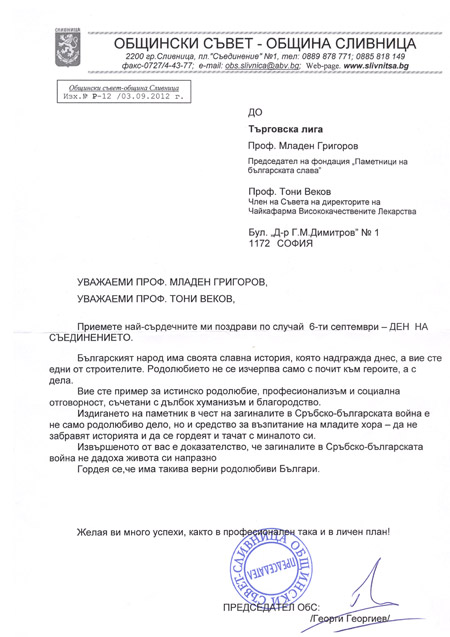-
October 7, 2014
The employers and the trade unions supported the revised budget of the NHIF proposed by the interim government. The social partners, however, strongly objected against the situation in health care, stressing that health costs have doubled in the last five years but the quality of service remains the same.
The revision provides for the Health Insurance Fund to use the currently available transitional balance within BGN 100 million. by the end of the year.
Health Minister Miroslav Nenkov explained that the money will be used in four areas: health insurance payments to hospitals and for medical care – BGN 50 million, for cancer therapy – BGN 15 million, for medical devices used in hospital care – BGN 10 million and for medicines for home treatment and diet food – BGN 25 million.
The minister stressed that the management of the National Health Insurance Fund did not want money simly to “meet the ends” of the budget by the end of the year, but thought in the direction of an attempt to compensate for this shortage.
The Director of NHIF Dr. R. Todorova stated that under the current regulatory framework cashier can not afford not to pay the work done, whether it was done qualitatively or not.
The CITUB proposed the NHIF to be divided into two funds: “Healthcare Insurance” and “Medical Assistance” as a measure to overcome the crisis. According to the experts by improving the collection of installments, the fund will have more money and it will be clear where they are going. Such separation of the cash flows will force the state to pay properly and at 8% instead of at 4% the insurance of eight groups of citizens, including pensioners and students, officials and prisoners. The Unions add that such a separation may be done and the health insurance of the concerned groups allocated to a new Executive Agency “Medical Assistance”.
-
The Gerneral Practitioners can, without problems, report to the NHIF the Immunizations preformed in children despite the changes of the terms of their performance
There are no problems for the General Practitioners to report via the information system of the National Health Insurance Fund (NHIF) the immunizations, despite the change in the terms of the required immunizations for children (Ordinance amending and supplementing Ordinance No. 15 from 2005 on immunizations in the Republic of Bulgaria (prom., SG 54 from 07.01.2014, in force from 01.07.2014 years).
By letters dated August 7 and September 3, 2014 the Directors of the RHIF were informed by the Director of the NHIF of the changes to the Ordinance. Attached to the letters were a letter of the Chief State Health Inspector and an Order of the Minister of Health.
The amendments to the Immunization Schedule of the Republic of Bulgaria related to the changes in timing of the required immunizations are consistent with the reporting and payment of the required immunizations performed under contract with the NHIF. For this purpose, the Director of the National Health Insurance Fund – Dr. R. Todorova, has sent letters to the directors of the Regional Health Insurance Funds, which remind them again to inform the providers of primary outpatient care under contract with the institution.
-
Levofloxacin monotherapy is highly effective in community-acquired pneumonia
Levofloxacin is one of the three respiratory fluoroquinolones that are recommended for empirical treatment of a wide range of patients with community-acquired pneumonia (CAP).It is a second generation fluoroquinolone and compared with the first generation products has improved efficacy against Gram-positive microorganisms (particularly S. pneumoniae, including penicillin resistant strains, and macrolides) and against atypical pathogens.
In vitro levofloxacin shows antibacterial activity against most of the Gram-positive and Gram-negative organisms associated with CAP, as well as against atypical bacteria (M. pneumoniae, C. pneumonia, Legionella spp.).
All beta-lactam antibiotics are ineffective against the above noted atypical microorganisms. In contrast, respiratory quinolones such as levofloxacin have the highest activity against these pathogens, followed by tetracyclines and macrolides
Levofloxacin shows good in vitro activity against H. influenzae (a frequent cause of CAP in smokers and patients with COPD) and M. catarrhalis (including beta-lactamase producing strains) and against methicillin- or oxacillin-susceptible strains of S. aureus.
Levofloxacin is approved for the treatment of systemic infections caused by P. aeruginosa.
After oral administration, this antibiotic has a good bioavailability in the tissue (almost 100%), and reaches peak tissue concentration after 3 hours. Its long half-life allows for convenient once-daily dosing.
Comparative randomized multicenter studies have shown that the levofloxacin has good clinical and bacteriological efficacy in the treatment of mild, moderate and severe CAP in immunocompetent adult patients – a clinical response is achieved in> 90% of the patients with low frequency of recurrence of the disease after the end of treatment .
Levofloxacin administered orally (at a dose of 500 mg once daily for a period of 7 to 14 days) has similar effectiveness to amoxicillin/clavulanic acid in elderly patients with mild CAP.
In hospitalized patients with severe CAP treatment with the fluoroquinolone (intravenous and then oral) is more effective than intravenous therapy with ceftriaxone and/or cefuroxime for achieving clinical recovery and bacteriological eradication.
In most CAP cases once-daily dose of levofloxacin achieved equal serum levels after oral or intravenous administration.
Advantages of levofloxacin:
– Favorable pharmacokinetics allowing once-daily dosing
– Broad antibacterial spectrum in in vitro conditions
– Good efficacy profile established in clinical studies
– Good tolerability profile
Tchaikapharma High Quality Medicines Inc. offers Levofloxacin on the Bulgarian market under the following trade name:
Levor 500 mg x 10 tabl. – BGN 14.99
-
September 24, 2012
Mr. Georgi Georgiev, Chairman, Town Council of Slivnitsa Municipality, greeted Prof. Mladen Grigorov, Chairman of the Bulgarian Monuments of Glory Foundation and Prof. Toni Vekov, Member of the Council of Directors, TchaikaPharma High Quality Medicines on the occasion of the National Unification Day – the 6th of September. Mr. Georgiev expressed his gratitude for the monument built in commemoration of the people who lost their lives in the Serbian-Bulgarian War and thanked them for their patriotic deed.
You can read the full text of the letter:
Town council – Slivnitsa Municipality
2200 Slivnitsa, Saedinenie sq. №1To
Prof. Mladen Grigorov
Chairman
Bulgarian Monuments Glory Foundation
Commercial LeagueProf. Toni Vekov
Member of Council of Directors
TchaikaPharma High Quality MedicinesDEAR PROF. GRIGOROV
DEAR PROF. VEKOV
I would like to extend my warmest greetings on the occasion of the 6th of September – the Unification Day of Bulgaria.
The Bulgarian people have a glorious history and you are among the contemporary history makers. Love to one’s country is measured not only by paying tribute to its heroes but by one’s deeds.
You are an example of real patriotism, professionalism and social responsibility and all that complemented by deep humanism and nobility.
Building a monument in commemoration of the people who lost their lives in the Serbian-Bulgarian War is not only a patriotic deed but also a way of educating young people to remember their history and take pride in their past.
Your deed only proves that all Bulgarians who died in the Serbian-Bulgarian War did it for a good cause.
I am proud of such patriots like you.
I wish you the best of luck in your personal and professional lives!
Georgi Georgiev
Chairman
Slivnitsa Town Council -
August 3, 2012
Tchaikapharma High Quality Medicines Inc. was acknowledged for a consecutive time for its contribution to the development of the pharmaceutical sector in Bulgaria. The Chairman of the Bulgarian Pharmaceutical Union, Miroslav Nenchev, sent a thank you letter to Tchaikapharma after the completion of the Bulgarian Pharmaceutical Days 2012 Forum. In it he underlines the assistance provided by the pharmaceutical manufacturer in the organization of this important event and expresses his assurance that the fruitful cooperation between both organizations will continue in the future. The full text of the letter is available at:
TO
TCHAIKAPHARMA
HIGH QUALITY MEDICINES INC.Dear colleagues,
I would like to thank you on behalf of the Management Board of the Bulgarian Pharmaceutical Union for your participation in one of the most significant events of the pharmaceutical sector – the Bulgarian Pharmaceutical Days 2012.
The event conducted under the motto “Equal access to medicines and pharmaceutical care” gathered together more than 1800 pharmacists from all over the country as well as academics and representatives of the judicial and legislative branches.
Your support was of great importance for making this event a success.
All positive comments about your company made by the participants makes us confident that the fruitful cooperation between you and the Bulgarian Pharmaceutical Union will continue in the future, especially in the area of developing and carrying out projects related to continued medical education.
Sincerely yours,
Miroslav Nenchev, MPharm
Chairman of Management Board
Bulgarian Pharmaceutical Union



